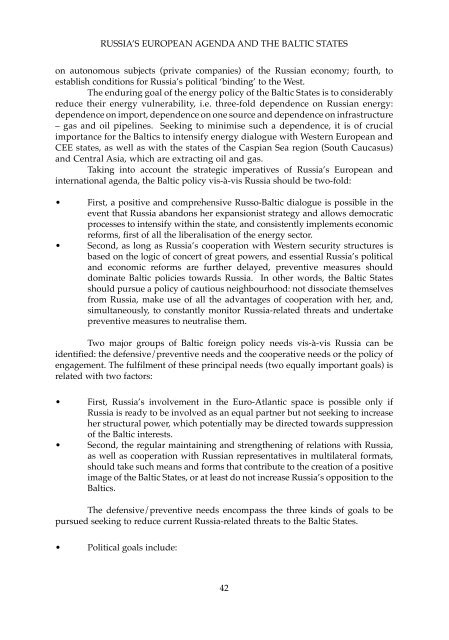Russia's European Agenda and The Baltic States - Defence ...
Russia's European Agenda and The Baltic States - Defence ...
Russia's European Agenda and The Baltic States - Defence ...
Create successful ePaper yourself
Turn your PDF publications into a flip-book with our unique Google optimized e-Paper software.
RUSSIA’S EUROPEAN AGENDA AND THE BALTIC STATES<br />
on autonomous subjects (private companies) of the Russian economy; fourth, to<br />
establish conditions for Russia’s political ‘binding’ to the West.<br />
<strong>The</strong> enduring goal of the energy policy of the <strong>Baltic</strong> <strong>States</strong> is to considerably<br />
reduce their energy vulnerability, i.e. three-fold dependence on Russian energy:<br />
dependence on import, dependence on one source <strong>and</strong> dependence on infrastructure<br />
– gas <strong>and</strong> oil pipelines. Seeking to minimise such a dependence, it is of crucial<br />
importance for the <strong>Baltic</strong>s to intensify energy dialogue with Western <strong>European</strong> <strong>and</strong><br />
CEE states, as well as with the states of the Caspian Sea region (South Caucasus)<br />
<strong>and</strong> Central Asia, which are extracting oil <strong>and</strong> gas.<br />
Taking into account the strategic imperatives of Russia’s <strong>European</strong> <strong>and</strong><br />
international agenda, the <strong>Baltic</strong> policy vis-à-vis Russia should be two-fold:<br />
• First, a positive <strong>and</strong> comprehensive Russo-<strong>Baltic</strong> dialogue is possible in the<br />
event that Russia ab<strong>and</strong>ons her expansionist strategy <strong>and</strong> allows democratic<br />
processes to intensify within the state, <strong>and</strong> consistently implements economic<br />
reforms, first of all the liberalisation of the energy sector.<br />
• Second, as long as Russia’s cooperation with Western security structures is<br />
based on the logic of concert of great powers, <strong>and</strong> essential Russia’s political<br />
<strong>and</strong> economic reforms are further delayed, preventive measures should<br />
dominate <strong>Baltic</strong> policies towards Russia. In other words, the <strong>Baltic</strong> <strong>States</strong><br />
should pursue a policy of cautious neighbourhood: not dissociate themselves<br />
from Russia, make use of all the advantages of cooperation with her, <strong>and</strong>,<br />
simultaneously, to constantly monitor Russia-related threats <strong>and</strong> undertake<br />
preventive measures to neutralise them.<br />
Two major groups of <strong>Baltic</strong> foreign policy needs vis-à-vis Russia can be<br />
identified: the defensive/preventive needs <strong>and</strong> the cooperative needs or the policy of<br />
engagement. <strong>The</strong> fulfilment of these principal needs (two equally important goals) is<br />
related with two factors:<br />
• First, Russia’s involvement in the Euro-Atlantic space is possible only if<br />
Russia is ready to be involved as an equal partner but not seeking to increase<br />
her structural power, which potentially may be directed towards suppression<br />
of the <strong>Baltic</strong> interests.<br />
• Second, the regular maintaining <strong>and</strong> strengthening of relations with Russia,<br />
as well as cooperation with Russian representatives in multilateral formats,<br />
should take such means <strong>and</strong> forms that contribute to the creation of a positive<br />
image of the <strong>Baltic</strong> <strong>States</strong>, or at least do not increase Russia’s opposition to the<br />
<strong>Baltic</strong>s.<br />
<strong>The</strong> defensive/preventive needs encompass the three kinds of goals to be<br />
pursued seeking to reduce current Russia-related threats to the <strong>Baltic</strong> <strong>States</strong>.<br />
• Political goals include:<br />
42

















